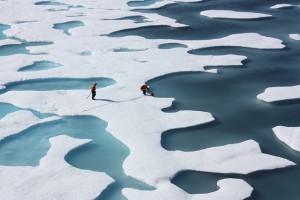Disaster and climate science – the story of Mt Pinatubo
This is a post-script to the blog entries from the Philippines by our reporter Carl Gierstorfer:
On my last day before returning to Berlin, I climbed Mount Pinatubo. Or rather what's left of Mount Pinatubo. Because in June 1991 a series of volcanic eruptions blew the top 160 meters off this mountain. A cloud of volcanic ash rose some 34 kilometers into the Earth's atmosphere (here is some more information and a picture from space, taken by the orbiting Shuttle crew). The evil twist in Pinatubo's eruption was that it coincided with a typhoon sweeping over Luzon Island. The heavy rains washed out much of the ash and deposited it over a wide area. Mudslides, called Lahars, destroyed villages and left 700 people dead. Large parts of this rice granary of the Philippines were covered in sediments up to one meter high. Probably worst hit were the indigenous Aeta people who used to live on the slopes of Mt Pinatubo. Although they managed to flee before the eruption, their habitat was destroyed; they were resettled in refugee camps, where many ended up as beggars and alcoholics.
The eruption had quite a dramatic effect on the world's climate. The following winter was unusually warm in the Northern hemisphere, while the Near East saw snow and corals died of cold shock in the Red Sea. For scientists these climate anomalies were a unique chance to calibrate their models against reality.
This is a short video I shot of the Pinatubo crater lake. What once must have been the most hostile spot on this planet is today a strangely tranquil and peaceful place. But don't be mistaken: Pinatubo is just sleeping as the bubbles of sulphuric gas and spots of hot water remind us. Enjoy.






